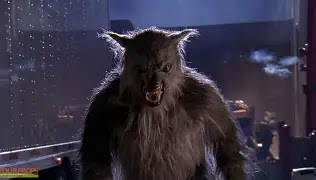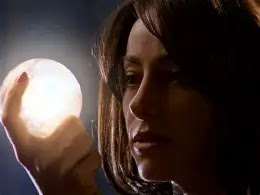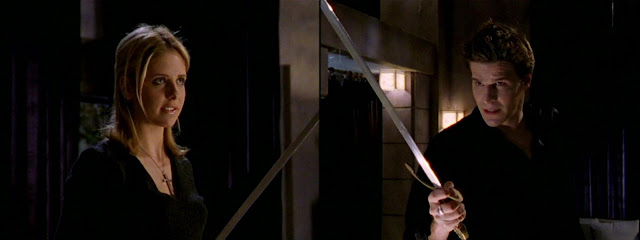PHENOMENALITY: *marvelous*
MYTHICITY: *fair*
FRYEAN MYTHOS: *adventure*
CAMPBELLIAN FUNCTION: *metaphysical, psychological, sociological* With Season 2, BUFFY takes on its true structure, as against the "scaffolding" provided by Season One, which means that for the purposes of my review I can once more return to the practice assigning grade-letters to the episodes for Poor, Fair and Good. Whedon ramped up the backstories of all of the regular the characters, upgraded David Boreanaz's Angel to that of a regular cast-member, increased the participation of Cordelia, introduced a continuing boyfriend for Willow, and quickly dispatched the inadequate menace of "the Anointed One" in favor of the deadly duo of Spike and Drusilla, both of whom had intimate ties to Angel's origins. There's also a greater elaboration of the Slayer mythology, which would bear larger fruit in future seasons.
WHEN SHE WAS BAD (G)-- Joss Whedon both wrote and directed the premiere episode of Season 2, just as he had the season finale of Season 1. But though PROPHECY GIRL is one of the better episodes of that season, BAD is the show's first leap into new territory. Buffy Summers was certainly not the first hero to cavil at her unjust destiny as a hero, or to refuse the call, or even to become irked with the ingratitude of the people he/she saved. But I can't think of a previous hero who started bagging on her friends to express her resentments. Giles only speaks part of the truth, that Buffy becomes hostile toward her inner circle due to her near-death trauma. But when she does a sexy dance with Xander, the fellow who saved her life but remains in the "friend zone," she mocks his secret desire to be rewarded for his Galahad-like actions, even though he made no such demands upon her. She resents them all, including Angel, for forcing her to be their hero, and only after she lets the "badness" run its course can she have a shot at regaining her natural "goodness." Next to all that, there's not much to derive from the plot of the Anointed One, a child-vampire who failed to project adequate menace from the first, to revive the Master. Still, the Master's skeleton does give Buffy a target on which to exorcise her trauma, and I suspect that Whedon had that scene planned out when the script for PROPHECY allowed for the Master's remains to survive in that form, rather than that of scattered ashes. SOME ASSEMBLY REQUIRED (F)-- While this one's more back in the mode of the first season's "freak of the week" pattern, it's still fun to see how the writers managed to work out a Frankenstein theme in the context of Buffy's high school-- making it one of the few menaces not explicity tied to the Hellmouth. SCHOOL HARD (F)-- While Buffy and friends try to navigate the perils of a Parent-Teacher conference, Spike and Drusilla come to town and take over the Anointed's operation. From the first, the two of them make an appealing villainous pair, showing an abiding love for one another despite their remorseless murders of human victims. Spike remains associated with the series until the bitter end, thanks to the contrast between his rapacity and his acidic sense of humor. Even Buffy's mother Joyce gets a rare scene defending her superhero daughter, clouting Spike with a blunt object when he and his fellow undeads attacks the conference. INCA MUMMY GIRL (F)-- For once, a mummy gets some exposure before the more traditional werewolf. Ampata, an Incan princess sacrificed eons ago, revives in a Sunnydale museum and begins romancing Xander, who thinks she's an exchange student. Decent but nothing special. REPTILE BOY (F)-- Another just OK episode, as Buffy and Cordelia learn the problems of dating college boys. Some are so focused upon their advancement in the adult world that they're willing to sacrifice females to a reptilian demon living beneath Sunnydale.
HALLOWEEN (G)-- Though this episode isn't the first to play with "grass is greener" fantasies, the script uses Halloween as an occasion for most of the regulars to experience hypothetical lives as what they are not. All of these are rooted in insecurities based in their current lives-- Xander wants to be more manly, Buffy wants to be more womanly, and Willow is at odds with her own sexuality. Ethan Rayne, a nasty acquaintance of Giles', bestows on the three of them, and several Sunnydale children, costumes that transform the wearers into literal versions of the identity portrayed. Apparently Raine just wants to spread chaos for no particular reason, much like the ancillary menace of Spike, who finds the transformation of Buffy into a helpless upper-class noblewoman much to his liking. Naturally Buffy bounces back and demonstrates the superiority of modern Girl Power. The character of Oz (Seth Green) makes his second appearance on the show, presaging his hookup with Willow. LIE TO ME (F)-- Buffy reconnects with Ford, a fellow from her pre-Slayer existence, but he hasn't reached out to her just to invite her to beer and skittles. Ford represents a cult of vampire-fans who think the bloodsuckers are just a bunch of swinging dudes-- a prescient conception, coming about eight years before the first TWILIGHT book and its sprarkly vamps. Ford's evil action, that of betraying his friends to Spike's coterie, is rooted in tragedy, but he's not resonant enough to stand as a mythic character. THE DARK AGE (F)-- I'm assuming the "dark age" referenced was Rupert Giles' own youth. Thanks to the connivances of Ethan Rayne, the Buffy gang learns that the two of them once belonged to an occult group that unleashed a demon named Eyghon. This one's good mostly for showing that Giles, as much as Buffy, has his own cross to bear, even if it was one of his own forging. WHAT'S MY LINE PTS 1-2 (F)-- LINE might not have high mythicity-- though it's the first to explore the process by which Watchers choose and train Slayers-- but it's a roller-coaster ride of action and pathos. Spike finds a ritual that will help bring Drusilla out of her torpid state, and he needs to capture Angel, Drusilla's sire, to bring it off. To keep Buffy from interfering, Spike summons (pays for?) the services of a cult of assassins to kill her. At the same time the assassins arrive in Sunnydale, so does a mysterious young woman, Kendra, who attacks Angel and Buffy with her super-martial-arts skills. Turns out she's the new Slayer in town, activated when someone or something sensed Buffy's temporary death during PROPHECY GIRL. Kendra becomes the Buffy gang's ally against Spike and the assassins, and Buffy wonders if she might give up the Slayer duties to the New Girl. Up to this point, the series hasn't said much of anything about Buffy's relationship to her absent father, though by the way Buffy becomes jealous of Giles' regard for Kendra, clearly he's beginning to assume that status for her. Also, Xander and Cordelia start snogging on the sly. TED (P)-- "Go knock on his door, and he'll probably kill you." A new man, name of Ted (John Ritter), starts dating divorcee Joyce, but Buffy senses he's not the man he claims to be. I'd like to give the scripts points for referencing Freud, but it's sort of a Bizarro-Freud, in that the daughter is not Oedipally competing with her mother,but is rather renouncing the evil father in favor of the good one. Points deducted for the lack of backstory for Ted having made a "Stepford Husband" out of himself. BAD EGGS (P)-- The Buffy gang (not yet called "Scoobies") are assigned by a teacher to play parents to eggs, and there are some cute humorous touches here. But the revelation that certain henfruits are not from hens, but from some vague crustacean creatures that take over people's minds. Buffy has to deal with this case of demonic crabs and with two vampires from the Old West. SURPRISE / INNOCENCE (G)-- Buffy's friends want to surprise her with a party for her seventeenth birthday, but Spike and Drusilla have a different celebration in mind, bringing forth a demonic figure, the Judge, who may be capable of destroying the world. And the real surprise is the revelation that schoolteacher Jenny Calendar, a potential romantic interest for Giles, is in truth allied to the gypsy cultus that wants Angel to suffer. To her credit, Jenny tries to simply send Angel away, but complications ensue, and for the first time Angel and Buffy make love-- with tragic consequences. INNOCENCE is not labeled a "Part 2," but the story follows directly on the heels of SURPRISE's concerns, with the Judge still a threat, though "good vampire" Angel becomes a much more substantial threat. I've always thought Whedon's vampire cosmos was a little vague on the process of vampirization. Apparently, a demon invades the being of the vampirized victim, but the original soul remains, somewhere, because in this episode we learn that years ago, Angel aroused the ire of a gypsy tribe, and that they restored his human soul to him so that he would suffer. But to make sure if he never stopped suffering, they added a codicil by which he would return to his demonic self if-- he experienced bliss? At any rate, that's the story. The bad version of Angel, sometimes called Angelus, then torments the gang for several episodes after The Judge bites the dust, with aid from Spike and Drusilla. One of the most cynical myth-ideas here is that Buffy's act of innocence, that of opening herself up to her lover in the most intimate manner, also renders herself vulnerable to the degradations of experience.
PHASES (P)-- To compensate for the previous episode's heavy dramatics, Buffy's first encounter of the werewolf kind is comparatively light. There's not much attention to sussing out the lycanthrope's identity, since only two suspects are presented, and one of them is proved innocent halfway through the narrative. Oz, who's been invited into the gang since he started dating Willow, is the lucky wolf-man, who managed to keep his claws clean of human deaths during his full-moon rampages. The real menace is a misogynistic werewolf-hunter, given the generic name of Cain, who wants to add the beast-man's pelt to his collection. PHASES is unusually heavy with anti-male remarks, which becomes rather tiresome when it includes Willow bonding with Cordelia, mere days after the former pitches a fit at learning of the latter's relationship with Xander. BEWITCHED, BOTHERED, AND BEWILDERED (F)-- Cordelia dumps Xander, so he persuades budding witch Amy to cast a love spell on her. It backfires, and every female in Sunnydale, except for Cordelia, starts macking on the young man, including Buffy, Buffy's mom, Jenny Calendar, and Willow. The more serious menace of Angelus, Spike and Drusilla gets overshadowed by the comic romp.
PASSION (G)-- The short vacation from heavy drama ends. Though both Buffy and Giles feel betrayed by Jenny Calendar's agenda re: the curse upon Angel, the teacher begins researching a ritual that might return the vampire's noble soul. But Angelus and his buddies get wind of it, and this has fatal consequences for Giles' true love. The vengeful Watcher attacks the hideout of Angelus and his clique, and Buffy has to save Giles by clocking him. The episode is bookended by voiceovers about the ambivalent allure of passion, read by David Boreanaz, though the reflections might have made more sense coming from Anthony Stewart Head. KILLED BY DEATH (F)-- Buffy catches the flu and has to go to the hospital, despite a childhood experience that left her deathly afraid of hospital stays. But she becomes curious when juvenile patients report being menaced by a ghoulish creature whom only kids can see. Compared to many of the makeshift BUFFY monsters, "Der Kindestod" has a more Old-World demonic flavor, and the episode is strengthened by Buffy's relationship to the imperiled kids, as Buffy has to put aside her usual adolescent concerns in order to be "the adult in the room." I ONLY HAVE EYES FOR YOU (G)-- This time, instead of Angelus playing games with Buffy's heart, both the vampire and the vampire slayer becomes the pawns of an unquiet spirit haunting Sunnydale High. Jim Stanley, the ghost of a 1955 student, wants forgiveness for his having murdered his lover (and teacher) in a fit of passion. However, he keeps possessing victims in order to replay the scenario of the murder, which can have fatal consequences. The Buffy gang eventually figures things out, but the ghost's obsession is only solved by a contrivance that includes the eleventh-hour intervention of the late teacher's spirit. Still, the episode continues to excel with the theme of the almost corruptive influence of passion. GO FISH (F)-- The "freak of the week" here is so contrived that I almost designated this episode a "poor fish." However, there's just enough mythicity relating to the "war between men and women" to give the story a little more heft than the ordinary freak-show. And the menace, involving the mutation of the Sunnydale Swim Team into fish-men, almost certainly plays upon the sexual danger of that archetypal fish-man, The Creature from the Black Lagoon (who even gets name-checked).
BECOMING PTS 1-2 (F) -- Joss Whedon both writes and directs the season finale here as he did for Season One, but the results are just decent. Since Jenny's death in PASSION, the show teased viewers with the possibility that Buffy's gang would find the teacher's research as to how to restore the human soul to Angel. So of course they find it, in just such a way as to conflict with Buffy's determination to end the threat of Angelus for good. The audience gets a look at Angel's pre-vampire existence, before he's turned by Darla, a female vamp from the first episode. Kendra returns, but only to die in Part 1, in part to set up the appearance of Faith in Season 3. Angelus wants to unleash a demon that will consign the human world to a hell-dimension, but this is a doom too far for Spike. The limey vamp helps Buffy contend with Angelus so that he Spike can escape with his love Drusilla, which may or may not have been meant to presage Spike's return to the series later on. A minor character named Whistler, described (without explanation) as a "good demon," serves to provide extra exposition but nothing else. The episode includes Joyce forbidding her daughter from Slayage, and this plays into the final scene of a traumatized Buffy departing Sunnydale.











No comments:
Post a Comment